
Micromanaging Boss Makes His Employees’ Life Miserable, Gets What’s Coming To Him
Nobody likes a micromanager. They poison the entire workplace. So when Redditor PugC’s new boss turned out to be one, he made their job miserable.
Instead of focusing on their actual responsibilities, PugC had to write countless (and lengthy!) reports that served no purpose at all.
That is until the boss had to explain himself to upper management and tried to make PugC the scapegoat of the whole team’s worsened performance. The Redditor presented all the evidence to the board and justice was served.
Micromanagers can make the workplace a living hell
Image credits: Taisiia Shestopal (not the actual photo)
This one, however, got what he deserved
The excessive supervision that micromanagers put their employees under hurt the entire company.
Dima Suponau, the cofounder of Number For Live Person, believes micromanaging is even a form of bullying because it’s all about seeking control. So it’s no surprise that as a result employees feel disenfranchised, humiliated, belittled and their mental health deteriorates.
Here are some of the ways we all suffer when our bosses focus too much on scrutinizing our every move:
- Health issues such as depression, anxiety, sleep problems, and fatigue;
- Increased stress that affects all areas of their lives;
- Deteriorating self-esteem and confidence;
- Lack of motivation;
- Fear of losing their job, being demoted, or retaliated against.
There is no straight answer to why people micromanage. Maybe they fear failure, have an extreme need for control and domination, are inexperienced in management, have insecurities, or don’t trust their team members.
If you suspect you’re being micromanaged (or if you’re wondering whether you are a micromanager yourself), here is a list of the most common characteristics that prove that:
- Avoiding delegation;
- Becoming overly involved in the work of employees;
- Asking for frequent updates and status reports;
- Feeling the need to be cc’d in every email;
- Constant dissatisfaction and complaining;
- Leaving no room for creative initiatives and discouraging independent decision-making;
- Avoiding to pass skills and knowledge.
Luckily, the career coach at Relaunch Me, Leah Lambart, said that with some careful attention and action, employees might be able to improve their work situation if they end up working for a similar boss to the one in the story. Here are 5 tips she thinks can be useful:
Understand the triggers. Since people may micromanage for a number of reasons, they may not even realize they’re doing it.
“More often than not, it could be due to a personality trait. Often individuals with strong planning and organizational tendencies find it difficult to delegate. They find it hard to trust that someone else can do the job as well as them, or within the timeframe that they expect,” she explained.
It might be difficult, but if get to the bottom of what triggers your boss, then you’ll be better equipped to dealing with it.
Next, build trust. It is key to any healthy relationship, be it personal or professional.
According to Lambart, “Trust takes time to build, so you need to earn it by demonstrating to your manager that you’re on top of things, ensuring that tasks are completed on time and notifying them when there are delays.”
Keeping your boss informed about the progress of your work can do wonders for you. “Sometimes building a personal relationship can also contribute to improving trust between two parties.”
Open up a dialogue about the situation. “Micromanagement can often have a very negative effect on employees, causing low morale, lack of confidence, stifled creativity, and a general loss of independence and freedom,” Lambart pointed out.
“If you feel that your boss’s micromanagement tendencies are impacting your ability to fulfill your role to the best of your ability, then it might pay to address the issue in a sensitive and discreet manner,” she said.
“You need to explain politely how their behavior makes you feel and also have some specific examples on hand. You may also like to explain that you are more fulfilled at work when you feel empowered and can work independently.”
Done respectfully, this conversation could really help you. Sometimes.
But it’s also important to establish boundaries and expectations. “As part of the [talk] above, it may be useful to establish further clarity on the role responsibilities and expectations of both parties so that there’s no misinterpretation,” Lambart advised.
“Establish clarity around expected communication time frames, methods, and channels. If both parties are aware of what is expected in terms of communication, then there is less need for managers to be constantly checking in,” she said.
It’s often a good idea to continue to be proactive and talk to your boss, making sure they’re happy with your output. It might prevent things from slipping back to how they were.
“If your manager wants to be informed regularly then set up a regular communication channel to keep them informed before they need to ask,” Lambart suggested.
But if everything fails, who knows, maybe malicious compliance can work, too. After all, it did for PugC.
People were glad to hear that everything played out the way it did
285Kviews
Share on FacebookMy old boss wanted me and my marketing team to keep logs in 15 min sections. He was convinced we weren't making good use of time. We made copious notes every 15 mins, even including bathroom trips. We were both fielding up to 100 calls a day (my record was 128 calls...all were new clients interested in selling insurance with us. The call volume prevented us from getting other duties done. After 10 days, he told us to stop the logs. A week after that they brought in a new marketer to help. (we'd begged for help before that to no avail.) 6 weeks later another marketer was hired. Nothing further was said after that and things got better. At least he acted on our logs and doubled the staff.
My old boss wanted me and my marketing team to keep logs in 15 min sections. He was convinced we weren't making good use of time. We made copious notes every 15 mins, even including bathroom trips. We were both fielding up to 100 calls a day (my record was 128 calls...all were new clients interested in selling insurance with us. The call volume prevented us from getting other duties done. After 10 days, he told us to stop the logs. A week after that they brought in a new marketer to help. (we'd begged for help before that to no avail.) 6 weeks later another marketer was hired. Nothing further was said after that and things got better. At least he acted on our logs and doubled the staff.

 Dark Mode
Dark Mode 

 No fees, cancel anytime
No fees, cancel anytime 












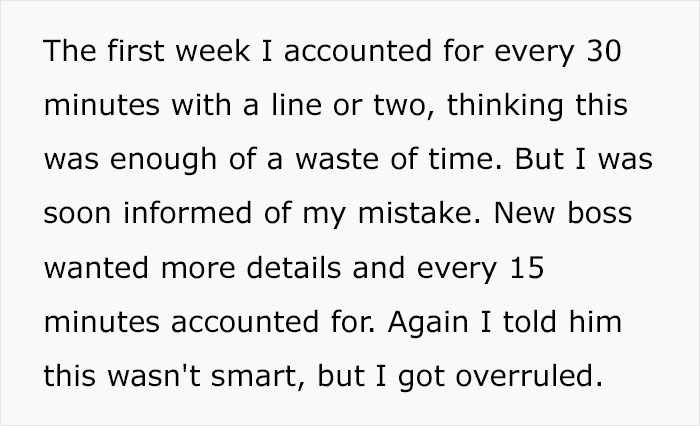
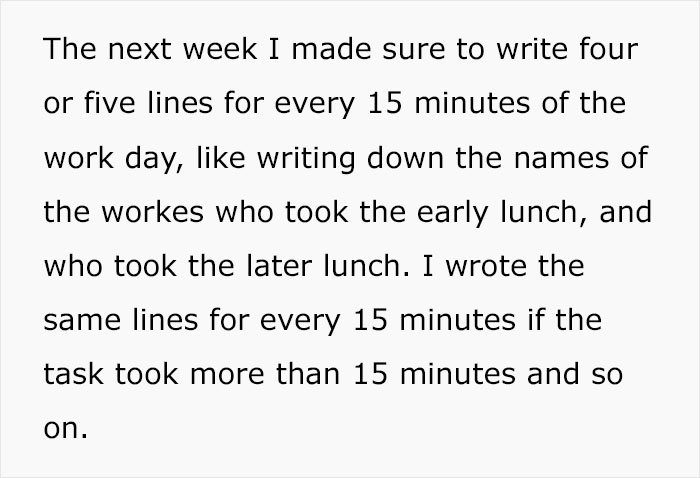




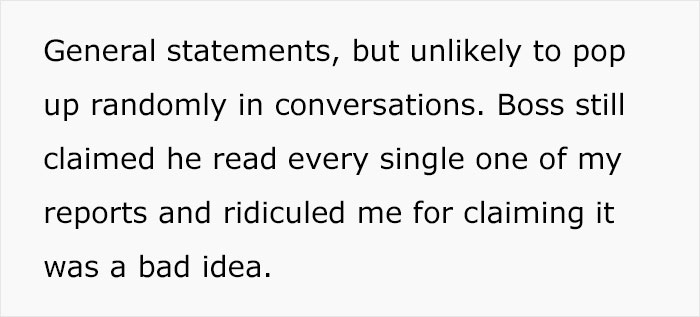


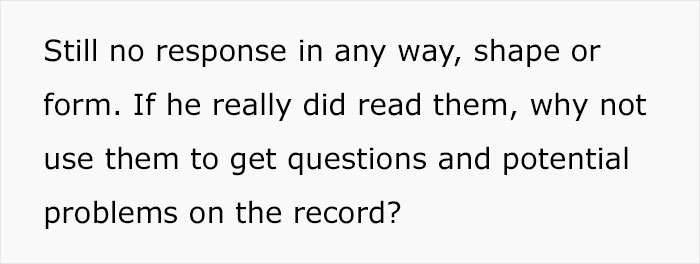

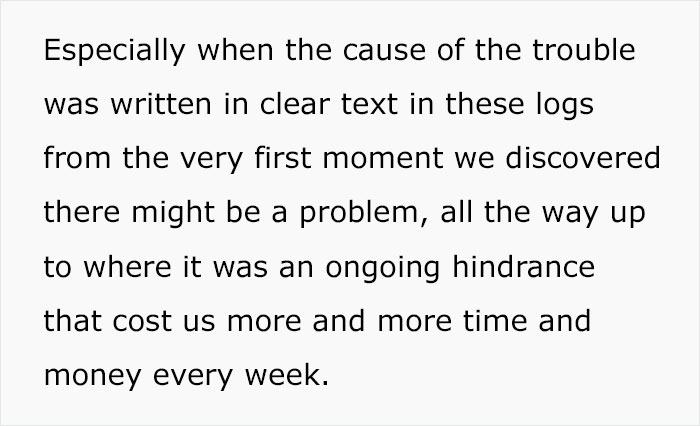







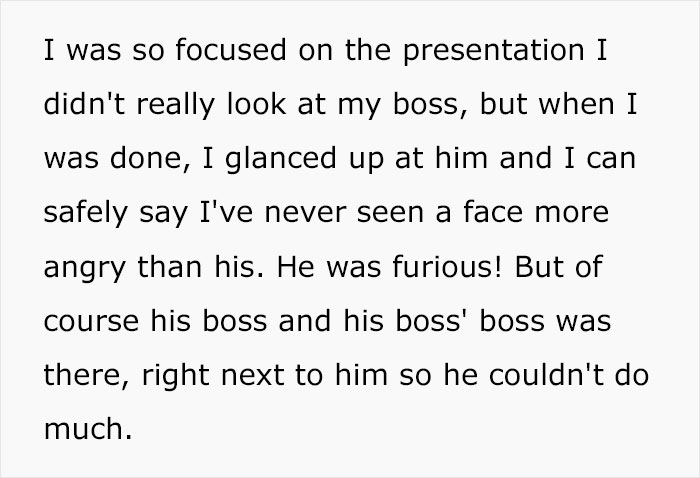























































138
18